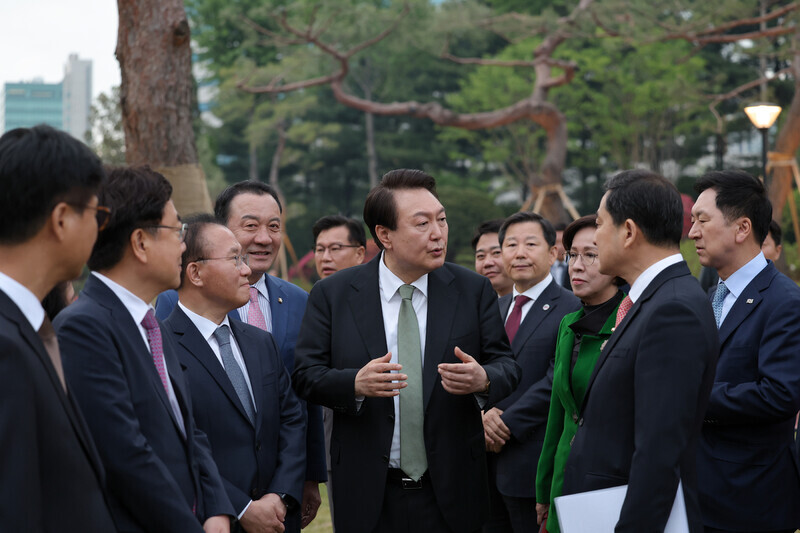hankyoreh
Links to other country sites 다른 나라 사이트 링크
60% of Koreans think their country’s democracy has backslid in the last year

Six out of ten Koreans think Korean democracy has been going in the wrong direction since Yoon Suk-yeol became president a year ago, a new poll finds.
The poll’s findings suggest that many Koreans think Yoon has taken a heavy-handed approach to running the country and hasn’t done enough to communicate with his critics in the political opposition and civic society.
According to a poll conducted by Global Research on behalf of the Hankyoreh through telephone interviews with 1,011 adults around the country on April 29-30, 60.2% of respondents said that Korean democracy has been moving in a negative direction over the past year, while 38.5% said it’s been moving in a positive direction.
The poll’s findings about the public view of Korean democracy were similar to those of polls commissioned by the Hankyoreh in January of this year (58.3% negative, 39.7% positive) and in December 2014, during the presidency of Park Geun-hye (60.5% negative, 35.8% positive).
But a more granular look at the findings shows that negative assessments are much stronger than before.
Among respondents to the poll, 32.4% said that Korean democracy is moving in a very negative direction, while 27.8% said it’s moving in a somewhat negative direction. The percentage of respondents who hold a very negative view on the direction of democracy was 5.7 points higher than in the poll four months ago (26.7%) and 18.4 points higher than in the poll nine years ago (14.0%).
“Yoon has rammed through decisions without accommodating public opinion on a wide range of government policies, including working hour flexibility (dubbed the ‘69-hour workweek’), foreign policy toward Japan, and North Korea policy. His unilateral and arrogant approach to running the government appears to have impacted [public] perceptions of democracy,” Jhee Byong-kuen, professor of political science and international relations at Chosun University, told the Hankyoreh on Wednesday.
In demographic terms, the cohorts with the most negative view of the state of Korea’s democracy over the past year are those in their 40s (74.1%) and 50s (72.5%). People in their 30s (63.8%) and 20s (62.7%) took a dim view as well.
In contrast, positive assessments outweighed negative ones among those in their 60s (54.7% to 44.8%) and those in their 70s and above (62.6% to 36.3%).
Opinions were sharply split between supporters of the two major parties. The majority of supporters of the opposition Democratic Party (89.9%) said democracy is moving in a negative direction, while most supporters of the ruling People Power Party (77.4%) said it’s moving in a positive direction. Among political independents, negative views far outnumbered positive ones (70.4% to 25.7%).
The perception of democratic backsliding in Korean society was also evident in respondents’ assessment of the Yoon administration’s efforts to communicate with and embrace its opponents over the past year.
A full 69.4% of respondents said the Yoon administration hadn’t done a good job in such efforts, while just 28.1% said it had. That critical view was held by an absolute majority (93.6%) of Democratic Party supporters, as well as 33.9% of People Power Party supporters.
“While assessments of democracy have a strong tendency to split along party lines, just like job performance ratings, the need to move toward unity in political culture is even being voiced within the [Yoon] camp,” said a source at Global Research.
Overview of surveySampling error: ±3.1 percentage points at a 95% confidence level
Response rate: 9.1%
Sampling frame: Anonymized mobile phone numbers provided by Korea’s three telecom companies
Survey method: Telephone interview
For more details, refer to the website of the National Election Survey Deliberation Commission.
By Kim Mi-na, staff reporter
Please direct questions or comments to [english@hani.co.kr]

Editorial・opinion
![[Column] How tragedy pervades weak links in Korean labor [Column] How tragedy pervades weak links in Korean labor](https://flexible.img.hani.co.kr/flexible/normal/500/300/imgdb/original/2024/0703/8717199957128458.jpg) [Column] How tragedy pervades weak links in Korean labor
[Column] How tragedy pervades weak links in Korean labor![[Column] How opposing war became a far-right policy [Column] How opposing war became a far-right policy](https://flexible.img.hani.co.kr/flexible/normal/500/300/imgdb/original/2024/0702/5017199091002075.jpg) [Column] How opposing war became a far-right policy
[Column] How opposing war became a far-right policy- [Editorial] Korea needs to adjust diplomatic course in preparation for a Trump comeback
- [Editorial] Silence won’t save Yoon
- [Column] The miscalculations that started the Korean War mustn’t be repeated
- [Correspondent’s column] China-Europe relations tested once more by EV war
- [Correspondent’s column] Who really created the new ‘axis of evil’?
- [Editorial] Exploiting foreign domestic workers won’t solve Korea’s birth rate problem
- [Column] Kim and Putin’s new world order
- [Editorial] Workplace hazards can be prevented — why weren’t they this time?
Most viewed articles
- 110 days of torture: Korean mental patient’s restraints only removed after death
- 2In the blink of an eye, an unthinkable crash turned a night out into a nightmare
- 3Families, friends mourn loved ones cut down in prime in deadly car crash
- 4Experts cast doubt on driver’s claim that sudden unintended acceleration caused deadly crash
- 5[Column] How tragedy pervades weak links in Korean labor
- 6Democrats seek to impeach 4 prosecutors, including those tied to probes into Lee Jae-myung
- 7KCC chief resigns to avoid impeachment, the second in 7 months
- 8More South Koreans, particularly the young, are leaving their religions
- 9Dreams of a better life brought them to Korea — then a tragic fire tore them apart
- 10Korea to create dedicated population strategy ministry to combat low birth rate, aging society